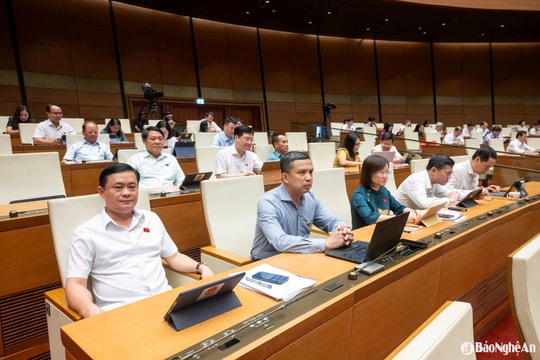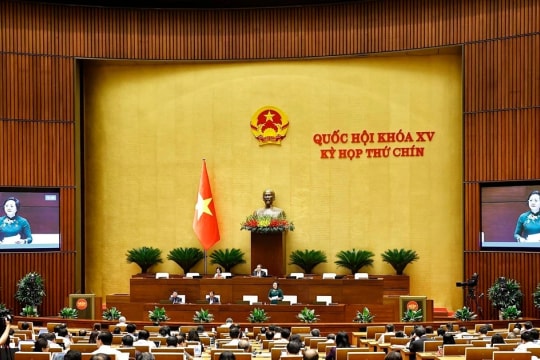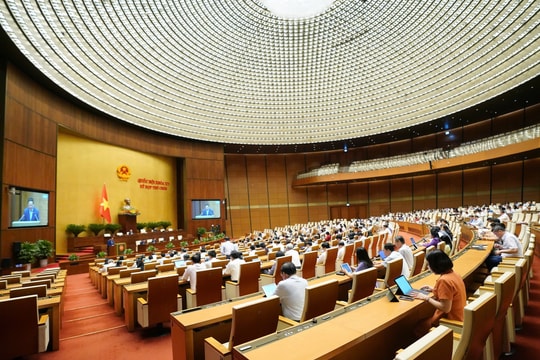National Assembly delegates from Nghe An province give comments on amending and supplementing a number of articles of the Constitution.
On the afternoon of June 13, continuing the 9th Session, the National Assembly discussed the draft Resolution of the National Assembly amending and supplementing a number of articles of the 2013 Constitution (second time).
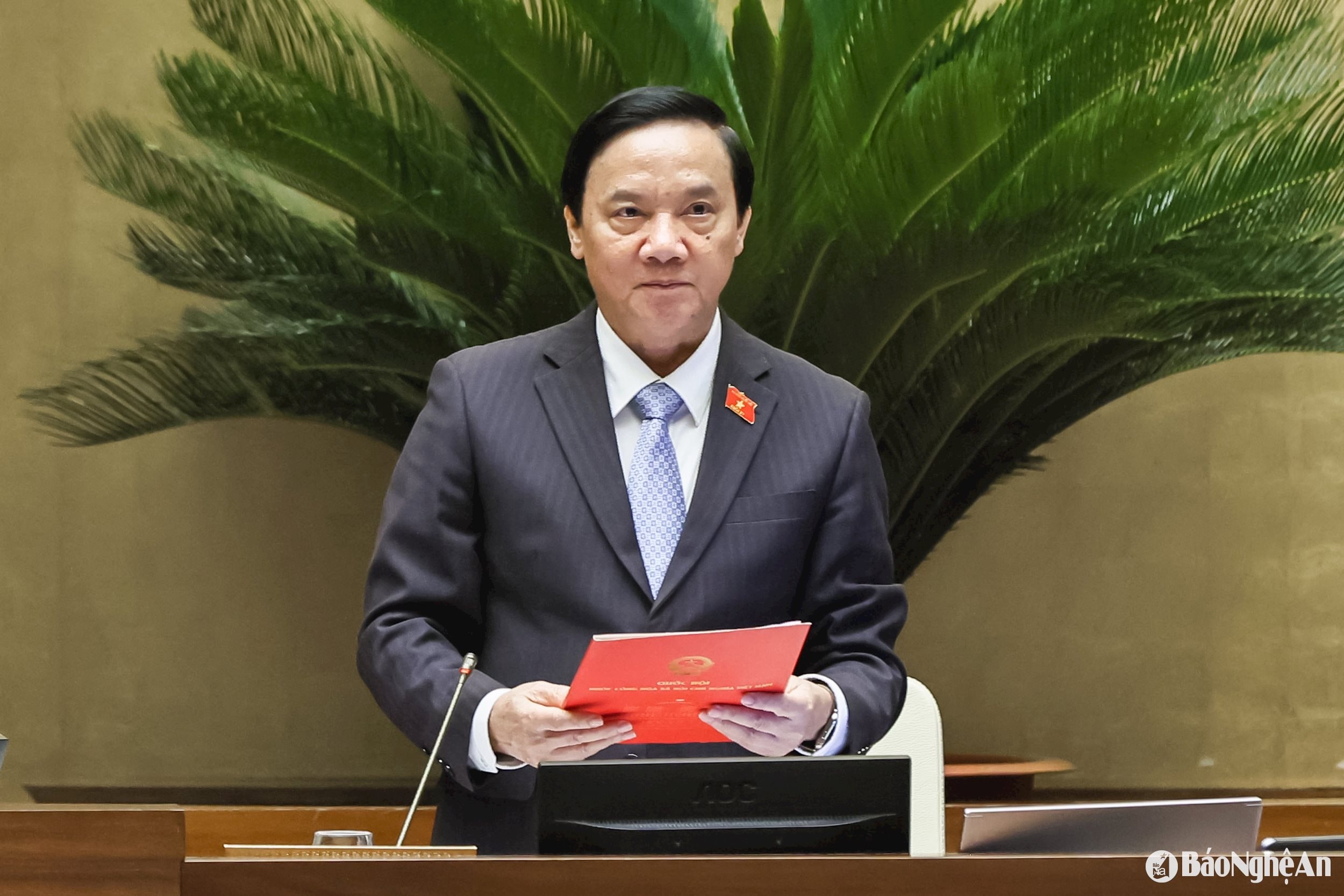
Speaking at the discussion, Mr. Tran Nhat Minh - full-time National Assembly delegate of Nghe An delegation basically agreed with the contents expected to be absorbed and revised.
However, from the careful research process, the delegates made two specific contributions, focusing on ensuring the legal basis and consistency in the legal system, especially the right of the People's Council delegates at the commune level to question the Chief Justice of the People's Court and the Chief Prosecutor of the People's Procuracy and the issue of constitutional techniques.
Accordingly, delegate Tran Nhat Minh expressed his agreement with maintaining the right of People's Council delegates to question the Chief Justice of the People's Court and the Chief Prosecutor of the People's Procuracy.
However, according to the draft Law on the Organization of People's Courts being considered by the National Assembly for approval at this session, the People's Court system is organized according to a 3-level model: the Supreme People's Court, the Provincial People's Court and the Regional People's Court. Accordingly, there will be no Court level equivalent to the local government at the commune level.
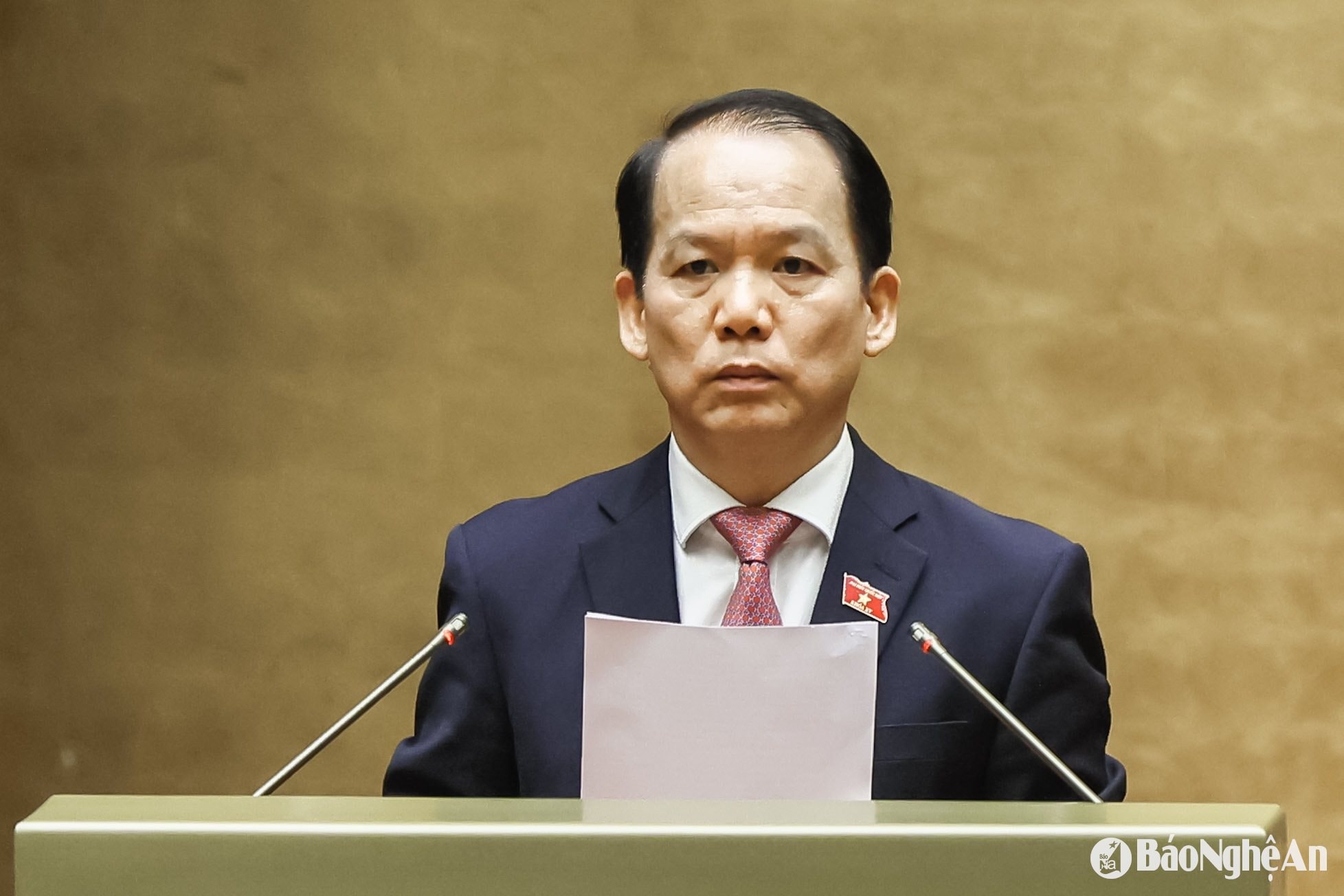
“Thus, the question is how do commune-level People's Council delegates exercise their right to question the Chief Justice of the People's Court and the Chief Prosecutor of the People's Procuracy? Which level of People's Council delegates have the right to question the Chief Justice of the Regional People's Court and the Chief Prosecutor of the Regional People's Procuracy?”, he analyzed. “Because if the current provisions of the Constitution are maintained, commune-level People's Council delegates still have the right to question the Chief Justice of the People's Court and the Chief Prosecutor of the People's Procuracy.”
Regarding this issue, in Report No. 41 dated May 30, 2025 of the Supreme People's Court on synthesizing the results of collecting opinions on the draft Resolution amending and supplementing a number of articles of the 2013 Constitution, it is proposed to "assign the Provincial People's Council to question the Chief Justice of the Provincial People's Court or the centrally-run city in the direction that the regional People's Court reports on its work to the Chief Justice of the Provincial People's Court or the centrally-run city; the Chief Justice of the Provincial People's Court or the centrally-run city reports on the work of his Court and the regional People's Court to the Provincial People's Council".
According to the Government's Report, "the results of synthesizing opinions from the People, sectors and levels show that there are many opinions suggesting continuing to maintain this mechanism and adjusting it in the direction of regulating that provincial-level People's Council delegates have the right to question the Chief Justice of the People's Court and the Chief Prosecutor of the People's Procuracy at the provincial and regional levels."
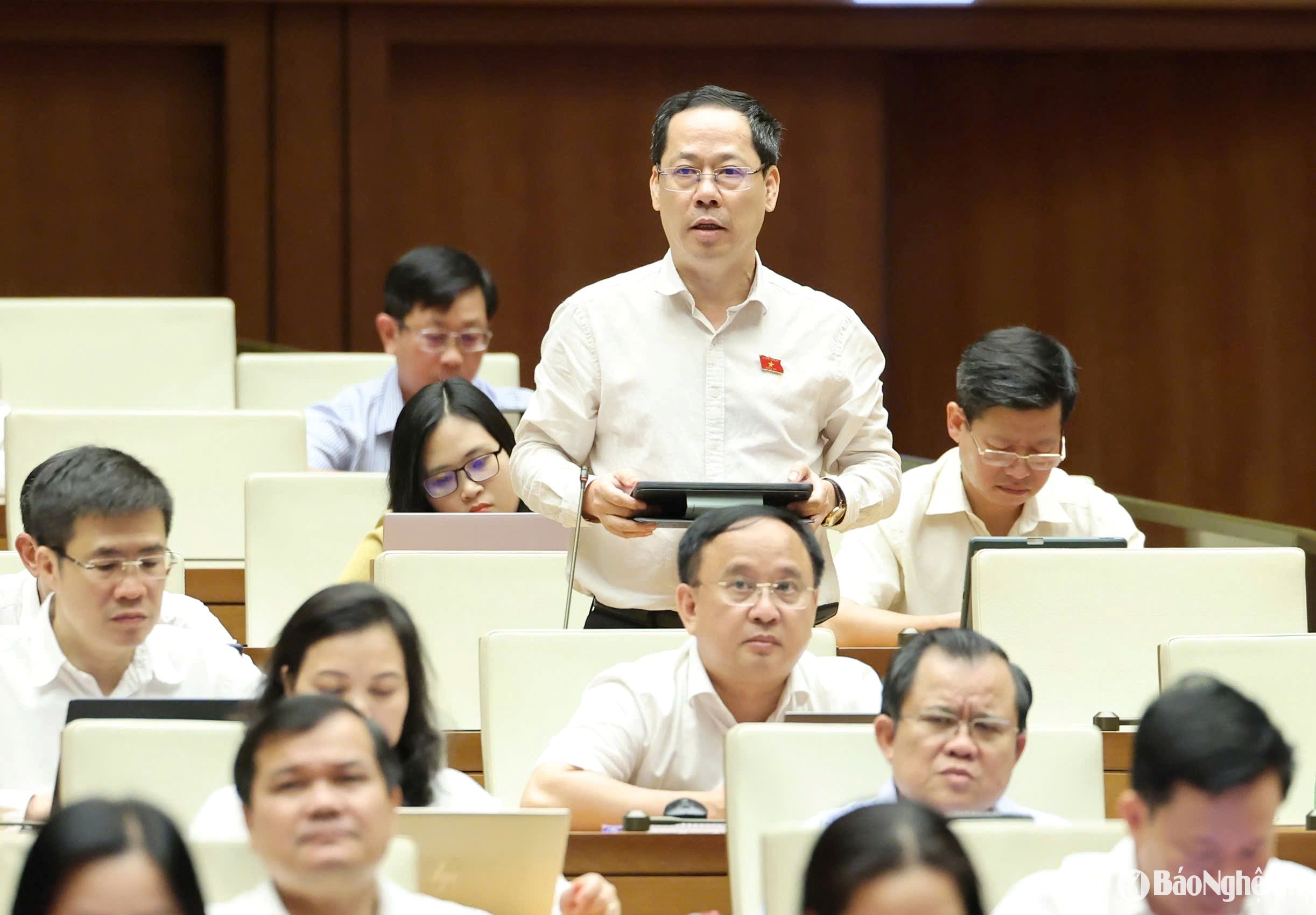
Delegate Tran Nhat Minh commented: The above proposal only ensures the right to question of provincial-level People's Council delegates but does not ensure the right to question of commune-level People's Council delegates, which is not consistent with the provisions of Clause 2, Article 115 of the 2013 Constitution, so the proposal needs to be clarified.
However, he also said that the regulation of the questioning mechanism of People's Council delegates for the above positions cannot be specified in detail in this draft Resolution but needs to be specified in other relevant legal documents such as: Law on Organization of People's Courts, Law on Organization of People's Procuracy, Law on Organization of Local Governments... especially the Law on Supervision Activities of the National Assembly and People's Councils which is being studied for amendment and supplementation.
According to the delegate, in case relevant legal documents do not stipulate the right of the People's Council delegate at the commune level to question the Chief Justice of the People's Court and the Chief Prosecutor of the People's Procuracy as proposed above, the Constitution must empower the National Assembly to stipulate.
Therefore, in order to have a legal basis for specifying the provisions on the right of People's Council deputies to question the Chief Justice of the People's Court and the Chief Prosecutor of the People's Procuracy in related draft laws, delegate Tran Nhat Minh proposed to continue studying and amending Clause 2, Article 115 of the 2013 Constitution in the direction of adding the phrase "according to the provisions of the National Assembly" at the end of the phrase "Head of the agency under the People's Committee" and rewriting it as "People's Council deputies have the right to question the Chairman of the People's Committee, other members of the People's Committee, Chief Justice of the People's Court, Chief Prosecutor of the People's Procuracy and heads of agencies under the People's Committee according to the provisions of the National Assembly".
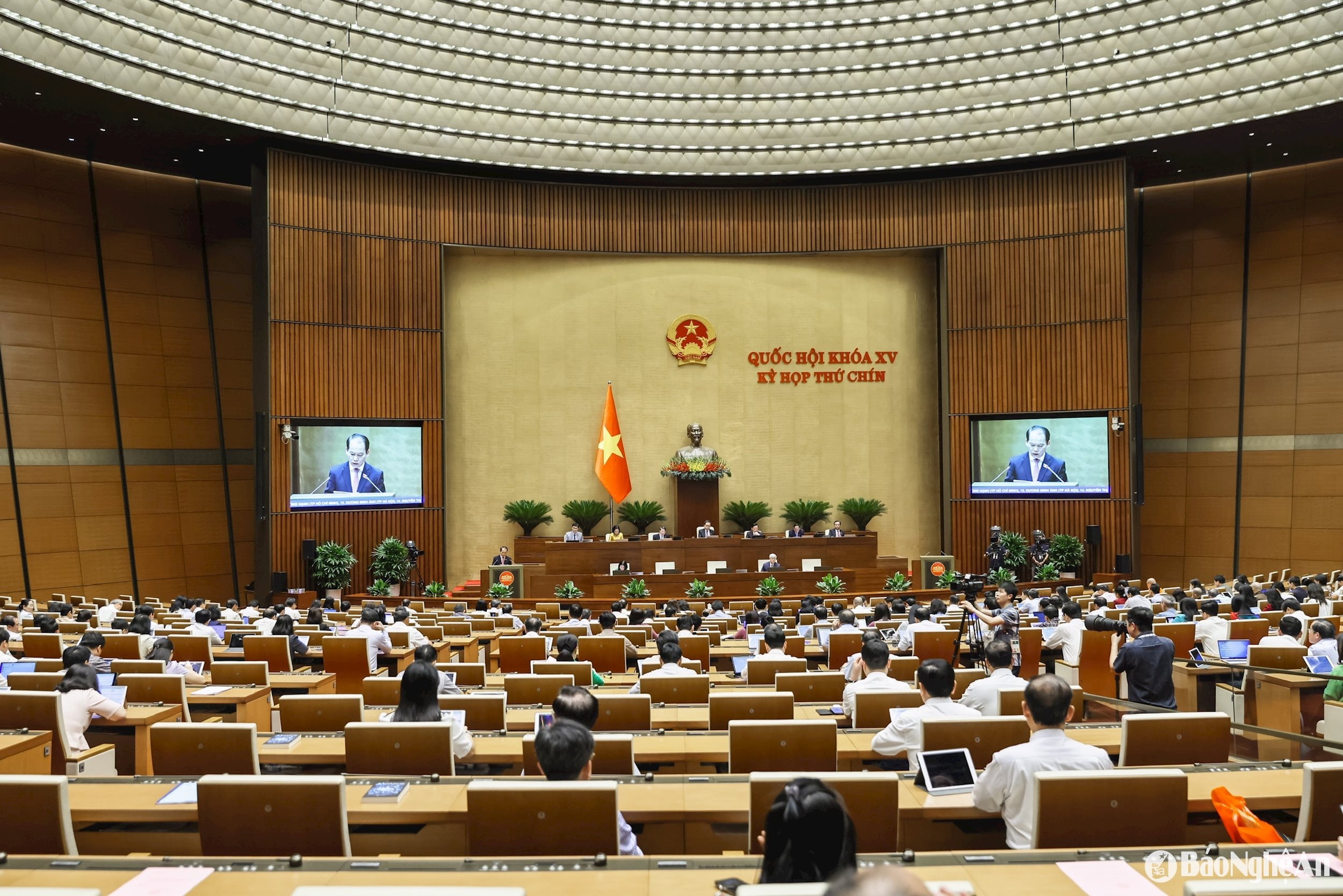
Regarding constitutional techniques, the draft Resolution still uses the phrase "city directly under the Central Government" (in Clause 4, Article 1 amending and supplementing Article 110 of the Constitution and Clause 3, Article 2).
However, the draft Law on Organization of Local Government being considered and approved by the National Assembly at this session and the Resolution on the arrangement of provincial-level administrative units just passed by the National Assembly do not use this phrase but only use the phrase "city".
“With the current organizational structure of the local government, when the model of provincial cities no longer exists, I think it is appropriate to use the phrase "city" to refer to "centrally governed cities". Therefore, I suggest that the drafting agency study and amend it to unify it,” said the delegate from Nghe An.
According to the Government's report, after 1 month of organizing to collect opinions, with the active participation of all classes of people, there were 280,226,909 comments from agencies, organizations and individuals on all contents and provisions in the draft Resolution of the National Assembly amending and supplementing a number of articles of the 2013 Constitution.
The vast majority of opinions (99.75%) agreed with the necessity of amending and supplementing a number of articles of the 2013 Constitution; agreed with the scope of amendments and supplements and the basic content of the draft Resolution amending and supplementing a number of articles of the 2013 Constitution as stated in the Submission of the Committee on drafting amendments and supplements to a number of articles of the 2013 Constitution.
In addition, there are also opinions suggesting reviewing and amending a number of other provisions of the Constitution; suggesting continuing to adjust constitutional techniques in a number of specific provisions to ensure the stability and longevity of the Constitution.
On the same afternoon, the National Assembly discussed in the hall the draft Law on Amending and Supplementing a Number of Articles of the Law on the Vietnam Fatherland Front, the Law on Trade Unions, the Law on Youth and the Law on Implementing Democracy at Grassroots Level.

